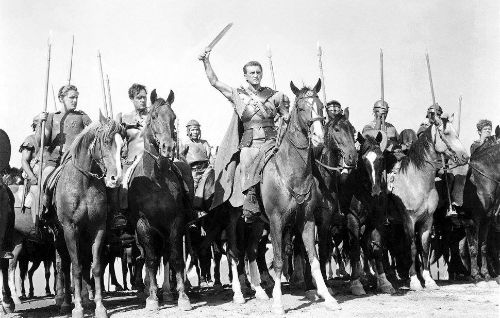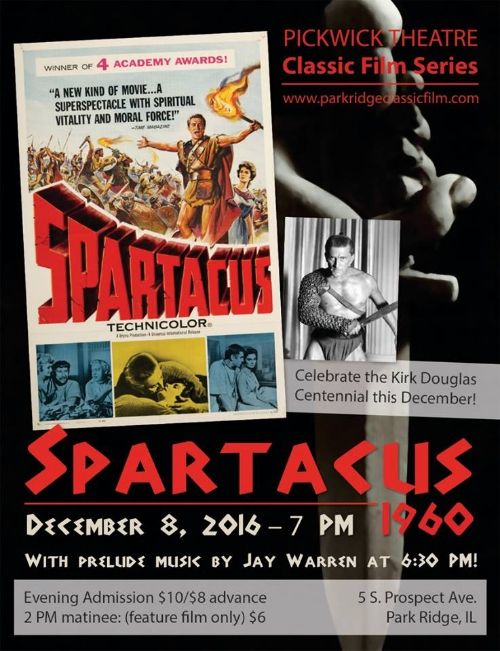The Pickwick Theatre Classic Film Series has celebrated many centennial events over the years, paying tribute to screen legends like Tyrone Power and Olivia de Havilland. We’ve honored both their life and career.
On December 8, we honor the film career of Kirk Douglas, who turns 100 the following day.
WHAT: Spartacus (1960) on DCP (restored and uncut)
WHEN: December 8, 2016 2 PM & 7:00 PM
WHERE: Pickwick Theatre, Park Ridge, IL
WHAT ELSE: Organist Jay Warren performs prelude music at 6:30 PM.
Steve Darnall, host of radio’s “Those Were the Days” (90.9 FM) will be our guest in the lobby.
HOW MUCH: $10 ($8 advance); $6 for 2 PM matinee
Every so often we present a film that has a particular resonance in our time, a relevance to events happening around us. Spartacus is a film that not only reflects the political issues of its era, but shines a light on the issues of today. The politically-minded viewer, for instance, might look upon the power-hungry Marcus Crassus, with his desire to make Rome great again, and see parallels to today’s nationalistic leaders. The film was made with HUAC and McCarthyism still fresh in Hollywood’s memory, but in 2016, it’s easy to see how new groups have been singled out. Heightened patriotism and loyalty oaths can be a slippery slope. But fifty-six years after its release, we keenly feel the inspiring moments of Spartacus. The “I’m Spartacus” scene, in which people stand up in unison with the eyes of Rome upon them, draws a direct link not only to the Hollywood blacklist, but to issues affecting liberty and freedom in our age. Though based on events from antiquity, the story of Spartacus speaks to every generation.
There are few films this season I have been looking forward to as much as Spartacus. It’s a film that can only be appreciated on a large screen. Made during the era of grand-scale moviemaking, it is one of the greatest historical epics ever made. Perhaps only Ben-Hur (1959) surpasses it. Based on the novel by Howard Fast, it is the enduring story of one man’s search for freedom against tyranny. Kirk Douglas plays Spartacus, a slave-turned-gladiator who leads an ill-fated revolt against the armies of Rome. Featuring an all-star cast including Laurence Olivier, Charles Laughton, Peter Ustinov (Best Supporting Actor Oscar), Jean Simmons, and Tony Curtis, the film is magnificent on all levels of production.
Directed by visionary (and perfectionist) filmmaker Stanley Kubrick, who replaced Anthony Mann, Spartacus makes stunning use of 35mm Super Technirama. This camera format allowed the filmmakers to capture more detailed, panoramic images. The battle scenes, in particular, showcase the value of this widescreen format. The film’s screenplay was written by the infamous Dalton Trumbo, a Communist who was one of the “Hollywood Ten.” According to Kirk Douglas, the film’s producer, he insisted on giving Trumbo screen credit, thereby facilitating the end of the blacklist. Another outstanding feature of this film’s production is the music. Composed and conducted by Alex North, the score rivals the best of Miklos Rozsa, who is often considered the greatest of epic composers.
There are vivid scenes we remember today– who can forget Douglas’ battle with Woody Strode in the arena?– but few are as uplifting as the “I’m Spartacus” moment. At this point in the film, the captured slaves have been offered freedom from crucifixion provided they first identify the man called Spartacus. In defiance of Crassus and his legions, the slaves stand together with each man declaring himself to be Spartacus. It’s a powerful scene that has often been cited as a direct response to the House Un-American Activities Committee hearings, in which citizens were called upon to name names.
This is a motion picture that can only be viewed in a theatre. We hope the community will take advantage of this rare opportunity to see an epic the only way it was meant to be seen.
**Spartacus will include an overture, a 10-minute+ intermission (01:47 into the movie), the entr’acte and exit music. The 2:20:1 original aspect ratio has been letterboxed. We are screening the 196 min. 2015 restoration.
~MCH
Though the film is best-remembered for Kirk Douglas, the supporting cast is something else.
The scenes between Charles Laughton and Peter Ustinov, in particular, are exceptional.



